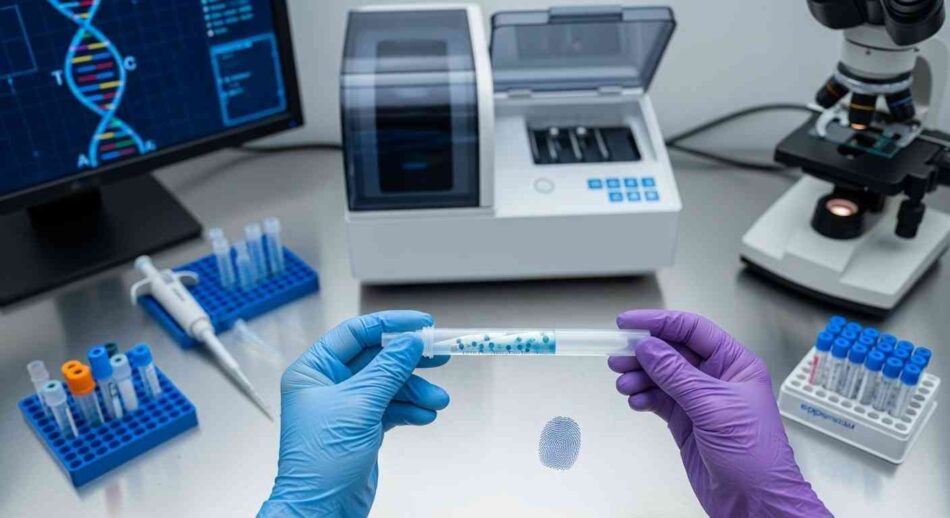Recently, forensic DNA testing has grown into one of the most useful ways to solve crimes, find missing family members, and identify people. DNA testing is a very important way to find out the truth, whether it’s about a cold case that police have been trying to solve for years or a family argument that could affect the law. Due to progress in biotechnology and lab methods, scientists can now get genetic proof from the smallest fragments and figure out what it means. This gives them unmatched accuracy and reliability in both legal and personal cases.
Introduction to Forensic DNA Testing
In forensic DNA testing, genetic material from a person is examined to identify them or see if it matches DNA from another person or evidence found at a crime scene[1]. This genetic material is usually found in blood, saliva, hair, or skin cells. Except for identical twins, everyone has a unique genetic makeup. Because of this, DNA research is an important tool in forensic science.
DNA samples are treated carefully and results are scientifically valid in modern labs because they use cutting-edge tools and standard testing procedures. Forensic DNA testing offers reliable proof that can be used in court for everything from locating crime suspects to settling family issues.
How DNA Evidence Solves Legal and Family Mysteries?
The way detectives and lawyers solve unsolved crimes is changing because of DNA technology. DNA from a crime scene, like a drop of blood, a strand of hair, or a piece of clothes, can either directly connect a suspect to a crime or rule them out completely. In many cases, this evidence is what turns things around because it gives solid proof where other evidence may only be suggestive.
DNA testing helps prove blood connections in both family and legal cases[2]. It can prove almost perfectly whether someone is a father, a mother, or a child. A lot of families use forensic DNA analysis to find long-lost cousins, make sure immigration claims are true, or settle disagreements about property.
The Science Behind Advanced Forensic Genetic Analysis
Advanced forensic genetic analysis is a very complicated science that makes sure every finding is correct. In this process, short tandem repeats (STRs), which are parts of DNA, are looked at. Gene “fingerprints” called STRs are unique to each person. Experts can tell if two DNA profiles match by looking at the STR patterns of the samples and comparing them.
Next-generation sequencing (NGS) technology is also used in modern DNA labs. This technology lets genetic material be analyzed more deeply and more quickly. NGS can find genetic differences that older methods might miss, making it more accurate and allowing analysis of samples that have been damaged. When only small or broken DNA samples are available to solve cold cases, this advanced forensic genetic analysis is very helpful.
Applications of Forensic DNA Testing in Modern Society
Criminal cases are only one application for forensic genetic testing. In cases of lost persons, it can help find bodies and give families who are mourning peace. When there are major tragedies like plane crashes or natural disasters, DNA recognition makes sure that victims are properly identified and returned to their families.
DNA technology is also very helpful in situations where people were wrongfully convicted. Many people who suffered injustice have been freed after years in jail due to DNA tests done after their convictions. When DNA proof is used, it helps people get justice and restores faith in the court system.
Ethical Considerations and Data Privacy
There is no doubt that DNA testing has benefits, but the growing use of genetic data brings up social concerns about privacy and permission. Genetic information is very private, and if it is misused, bad things can happen. Police departments and forensic labs must follow strict rules to make sure that DNA samples are only used for authorized investigations.
A lot of countries have rules that say how DNA data can be kept, viewed, and destroyed. People who are being tested for legal or family reasons should also be told how their information will be used and kept safe. To keep people trusting forensic science, it’s important to find a balance between technical growth and moral duty.
The Future of Forensic DNA Technology
The future of forensic DNA testing looks even brighter as technology keeps getting better. Scientists are working on ways to test things that are faster and can give data in hours instead of days. Portable DNA testers are being tried so that they can be used at crime scenes to help detectives process evidence right there.
Also, putting DNA data together with digital databases, artificial intelligence (AI), and other data will change the way detectives use genetic hints to link possible suspects or family members. However, this success needs to be supported by strict control to stop abuse and keep accuracy as the top goal. Choice DNA is one of the best labs in the US that delivers accurate and clear results for forensic testing. They are also working to deliver even better services in the future with advanced equipment and technology.
Conclusion
DNA testing for forensics is now an important part of all cases, connecting science and law. With the accuracy of advanced forensic genetic analysis, labs can find out secrets that were once out of reach. DNA evidence is still changing the law and the way people interact with each other. It can be used to solve crimes that happened decades ago, bring families back together, and prove innocence.
References:
[1] https://www.choicedna.com/our-testing-services/forensic-dna-testing/
[2] https://www.choicedna.com/relationship-dna-tests/







